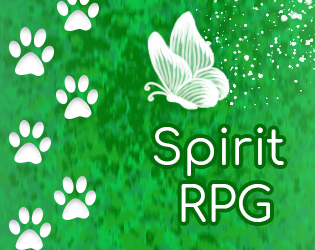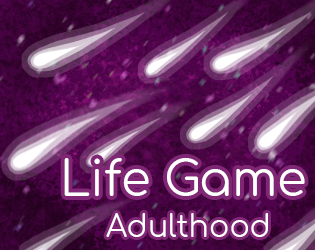In our introduction to this set of blog posts, we briefly mentioned why we chose to release our prototypes (Spirit RPG, and Life Game: Childhood, Teen, Adulthood) the way we did. We think they’re interesting, hopefully inspiring, and we’d rather see them out in the world than stuck in a digital storeroom gathering proverbial dust. But there is more to it than that, so to wrap up our prototype releases, we wanted to really answer the question(s) of ‘Why?’, and in doing so explore the feelings that go into making games which may not always be addressed in commercial development cycles.
Why not spend more (or less) time on these unfinished games?
We didn’t want to spend too much time on these prototypes – we’re focusing on Elemental Flow, so we’re not turning them into full-fledged games, which would have taken us a long time given their state when we booted them back up. At the same time, these prototypes were dropped mid-development, so tying up some loose ends was in order.
We set ourselves a deadline, working on the prototypes (and their associated blogs/Itch pages) when we weren’t freelancing or doing urgent Tea-Powered Games work. To figure out how best to spend our time, we listed changes based on whether they were…
- Necessary for the game to run properly
- Useful to improve player experience
- Optional little touches.
Teenage Years needed the most changes, being one of the more complicated games, and one where many systems were left mid-modification. Despite that, the time we set was plenty to do everything from columns 1 and 2, as well as a few from 3. Not only are the prototypes not broken, they more closely represent their imagined finished games. They were ambitious to begin with, but we felt they needed to be, in order to really get a feeling for the ideas they expressed.
But why release these prototypes at all? Why do you care so much?
Everything we work on holds a piece of us in it, like a message in a bottle that we send out to the world. Often, we write and design things we don’t see elsewhere – at least not in certain configurations or exploring specific ideas. Many games never see the light of day, or don’t make it out of development while resembling the thoughts which inspired them. That’s inevitable, and it’s ok! But as creators, we find that we put some of ourselves in each experience we create, so there’s an emotional toll to pay if we want to disconnect ourselves from them.
It’s hard to let go of a creation even in the best of times, but it’s especially odd for interesting or detailed prototypes. Even if we were to pick these projects up in the future, we would do them differently (thanks to the knowledge and experience we’ve gained in the meantime) and likely in a new platform altogether. There’s something particularly sad about these games not being able to connect with an audience the way we would have wanted if we were to fully develop them, so in many ways we are mourning the games that could have been, while appreciating the games that are.
Why encourage learning from these kinds of prototypes?
One of Destina’s definitions of Game Design is “making as many informed, conscious decisions about a game as possible within its development”. That means any time spent making decisions here, with these prototypes, is time that won’t have to be spent answering those questions from scratch later. This applies to the person making a game, but also to others who experience it! After all, every interesting game needs to answer thousands of logistical questions, each of which has myriad answers (some which work, some which don’t, and many which are not so cleanly resolved). While game design theory helps codify and condense some of the broader questions and answers, that works best alongside detailed contextual examples which showcase these answers, ugliness and all. In short, all results are important, and we hope to add something interesting (albeit small) to the larger canon of game design.
…Why is there a note here that says ‘talk about creation under capitalism’?
Because it permeates everything written in these blog posts. (And because it’s a subject we think is important to talk about.)
Releasing Life Game and Spirit RPG is not really what we’re ‘supposed’ to do. We spent on-the-clock hours to release unfinished and unpolished games, they’re available for free, and without a real marketing push. Meanwhile, we continue to work on Elemental Flow, a game that is longer in dev time than it ‘should be’ (read: will recoup in profit). All these things are not uncommon for hobby games, side projects or early in a game dev career, but less so for an established game dev company. Releasing games this way doesn’t exactly lead to traditional ‘success’.
There are many rules of thumb when it comes to games, like “find the fun” and “fail fast”. We have done some of that here – the prototypes themselves were all options we considered for future games, then dropped. However, to us, every game we make is precious, and has much of us in it. Will we get more chances to make a game chronicling the changes one undergoes through life with this much granularity? What about the mix of spirit befriending and world exploration represented by Spirit RPG? There will never be something else quite like these games, in the same way no two works of art are the same.* But creating art requires time and money (if only to keep you alive while you create), and these inevitably affect any decisions made about what’s worth creating.
Sometimes, as individuals and creators, we just need to decide that something matters enough or is interesting enough to us that we do what we can to give it substance – whether that’s a game which takes too much time, prototypes that are not polished enough, or ideas that are near-impossible to market. Of course, all of this sits alongside common game-making practices – there are many good lessons to be learned, and we’ve absorbed a lot of knowledge from personal experience and the work of others! But as we bump against the edges of what ‘can’ or ‘should’ be done, what is ‘profitable’ or fits within the ‘market’, we like to reflect on our limiting factors, and ways in which game creation (ours and others’) could be different.
If you read all the way through, thank you! We hope our games (or even just the discussion of our games) have given you something new to think about, or a new approach of your own.
-Destina & Flo
* No, we won’t get into “are games art?” Hopefully if you read this post, you’ll understand some of our feelings on the matter.


